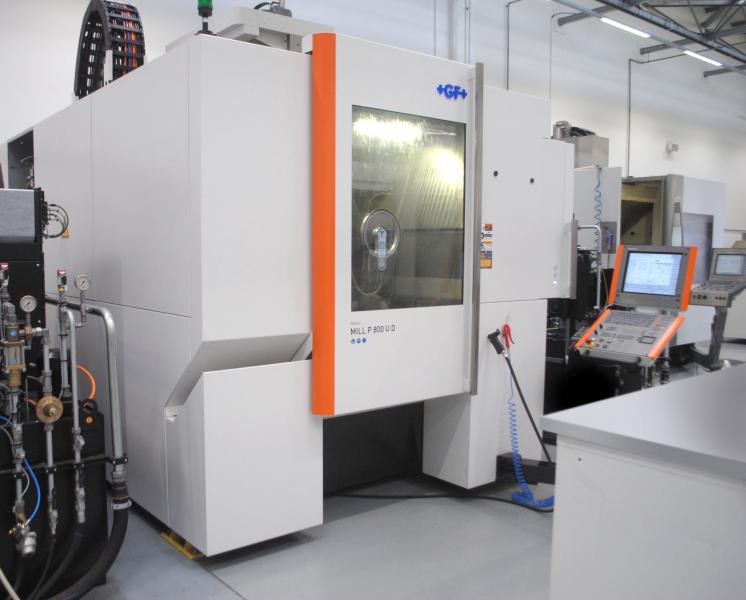
The machines - two Mikron HPM 800U’s and two Mikron HPM 1350U’s - have been installed at Renault Sport Formula One Team’s manufacturing facility in Enstone, Oxfordshire where they are being put through their paces machining a range of high-precision, complex race car components made from difficult-to-machine and challenging materials that include high-grade titanium alloys.
The investment in advanced machine tool technologies from GF Machining Solutions by Renault Sport Formula One Team is nothing new and reflects the close, longstanding ‘Technical Partner’ relationship that exists between the two companies.
This relationship, the longest in the Team’s history has, over recent years, seen GF Machining Solutions supply, not only a number of 5-axis machines to the Enstone facility, but also a range of the latest, high-performance AgieCharmilles EDM wire and die-sink machines too.
Says Raphael Willie, Machine Shop Manager at Renault Sport Formula One Team:
“We regularly invest in machine tools from GF Machining Solutions.
“A few years ago we made a strategic decision to increase our 5-axis milling capabilities and selected GF Machining Solutions as the Technical Partner to help us achieve our objectives.
“The partnership means that we are able to acquire the latest Mikron 5-axis machines at highly-competitive rates, and have direct access to GF Machining Solutions’ technical and applications expertise.
“As a consequence we are able to fully embrace the concept of ‘one-hit’ and simultaneous 5-axis machining, and to experience dramatic productivity gains, improve machine tool utilisation, increase component accuracies and repeatability’s, and reduce set-up and part cycle times.”
Technology Focus: HPM 800U 5-axis machines in action
As a result of its latest investment Renault Sport Formula One Team now has ten Mikron 5-axis machines at its disposal.
To improve its machining capacity and capabilities it was decided, in early 2017, to trade-in a Mikron HPM 600U machine (acquired a few years earlier) against the purchase of two new HPM 800U models.
Continues Raphael Willie:
“The HPM 600U was a good machine…didn’t miss a beat…and was universally liked by both operators and programmers alike.
“However, because we needed to increase our machining capacity and flexibility, we decided to invest in two larger Mikron HPM 800U machines.”
Although the new HPM 800U machines were larger and were more sophisticated than the HPM 600U machine they replaced, both models have a number of similarities (i.e. machine layout and architecture, control technology etc.).
This was an important consideration in determining which Mikron machines to acquire (i.e. reduce the learning curve required for machine operators to become confident and competent with the new machines, and enable part programs created for and on the HPM 600U to be used on the new machines).
The HPM 800U machines, since their installation in 2017, have proved their worth and are being used to machine a diverse range of parts that include front and rear suspension uprights and roll hoops etc. They have also been heavily involved in machining a number of gearbox inserts made from titanium.
These inserts are ‘new’ components, and reflect Renault Sport Formula One Team’s decision, for the 2018 season, to use a carbon-fibre main case for its gearboxes as opposed to investment cast titanium, used previously.
Explains Raphael Willie:
“Gearboxes, which are electronically controlled with hydraulic activation, attach to the back of the internal combustion engine. But, they do more than simply transfer the torque from the power unit (PU) to the wheels as they also form part of the structure of the rear of the car, with the rear suspension bolting directly onto what is now a high-strength and rigid carbon main case.”
Inside the gearbox are a number of performance-critical inserts. Amongst them is a front, top mounting part made from high-grade titanium.
This part is machined from solid on one of the HPM 800U machining centres.
The titanium billets used for this gearbox inserts are heavy and are 450mm x 230mm x 123mm in size. Apart from some wire EDM profiling operations, which take up to 12 hours to complete, the parts are 5-axis machined entirely on the HPM 800U machine.
There are essentially five different or separate milling operations performed on the machine.
These include initial work-holding/fixturing operations (2 hours), followed by two roughing operations which, combined, take over 20 hours to complete. Each insert then undergoes two lengthy finishing operations (over 40 hours).
Says Raphael Willie:
“The gearbox inserts are demanding applications.
“Material removal rates are high (over 85% of the titanium is removed during roughing and finishing operations), and the inserts are machined to a high accuracy and require an excellent surface finish.
“Furthermore, because we work to extremely tight and non-negotiable deadlines, it was critical that we were able do everything in our power to reduce part cycle times in order to assemble ‘finished’ gearboxes for Dyno Testing.”
Testing, which incidentally is still ongoing, is an evolutionary process and invariably results in ‘tweaks’ being made to the original design specification. This has been the case with the gearbox inserts and the HPM 800U machine has been used to machine a number of (insert) iterations.
Concludes Raphael Willie:
“Despite such demands our HPM 800U machines have not been found wanting and are amongst the most accurate, dynamic and reliable machining centres we have in our facility.”
Zoom Lebron XV 15













